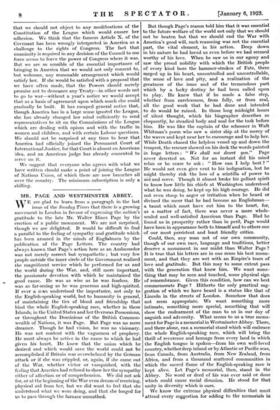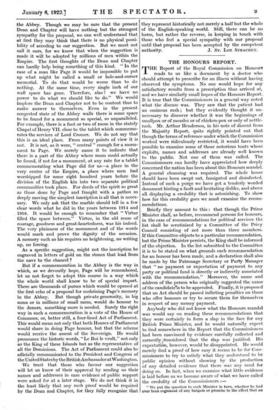MR. PAGE AND WESTMINSTER ABBEY.
'W E are glad to learn from a paragraph in the last issue of the Sunday Times that there is a growing movement in London in favour of expressing the nation's gratitude to the late Mr. Walter Hines Page by the erection of a public monument. We arc not surprised, though we are delighted. It would be difficult to find a parallel to the feeling of sympathy and gratitude which has been aroused in the minds of Englishmen by the publication of the Page Letters. The country had always known that Page's action here as an Ambassador was not merely correct but sympathetic ; but very few people outside the inner circle of the Government realized the magnificent service which he performed for us and the world during the War, and, still more important, the passionate devotion with which he maintained the good cause. He was as wise as he was fearless. He was as far-seeing as he was generous and high-spirited. If ever a TrAn understood the importance, not only to the English-speaking world, but to humanity in general, of maintaining the tics of blood and friendship that bind the whole English-speaking race, whether in these Islands, in the United States and her Overseas Possessions, or throughout the Dominions of the British Common- wealth of Nations, it was Page. But Page was no mere dreamer. Though he had vision, he was no visionary. He was not content with the vagueness of prophecy. He must always be active in the cause to which he had given his heart. He knew that the union which he desired and which would save the world could not be accomplished if Britain was overwhelmed by the German attack or if she was crippled, or, again, if she came out of the War, whether victor or vanquished, with the feeling that America had refused to show her the sympathy either of affection or of comprehension. We did not ask for, or at the beginning of the War even dream of receiving, physical aid from her, but we did want to feel that she understood what we were doing, and that she longed for us to pass through the furnace unscathed. But though Page's reason told him that it was essential to the future welfare of the world not only that we should not be beaten but that we should end the War with America's good will, such reasoning was not the essential part, the vital element, in his action. Deep down in his nature he had loved us even before we had seemed worthy of his love. When he saw us in our agony and saw the proud nobility with which the British people of every kind bore the hammer-strokes of Fate, there surged up in his heart, uncontrolled and uncontrollable, the sense of love and pity, and a realization of the greatness of the issue and of the tremendous part which by a lucky destiny he had been called upon to play. He knew that if he made a false step, whether from carelessness, from folly, or from zeal, all the good work that he had done and intended to do would be ruined. In those long midnight hours of silent thought, which his biographer describes so eloquently, he steadied body and soul for the task before him. He was like the captain of the schooner in Walt Whitman's poem who saw a sister ship at the mercy of the waves and kept near her to encourage and to help her. While Death chased the helpless vessel up and down the tempest, the rescuer showed on his deck the words painted in huge letters : " We shall not desert you." Page never deserted us. Not for an instant did his mind relax or he cease to ask : " How can I help best ? " He would not even give vent to his indignation, lest he might thereby risk the loss of a scintilla of power to aid and serve. Though it almost broke his gallant spirit to know how little his chiefs at Washington understood what he was doing, he kept up his high courage. He did not even stoop to anger or irritation when he heard or divined the sneer that he had become an Englishman— a taunt which must have cut him to the heart, for, as a matter of fact, there was never a more whole- souled and well-satisfied American than Page. Had he found us in prosperity rather than in peril, Page would have been in appearance both to himself and to others one of our most persistent and least friendly critics.
Could, then, any man not of our own community, though of our own race, language and traditions, better deserve a monument in our midst than Walter Page ? It is true that his letters are in one sense his best monu- ment, and that they are wet with an Empire's tears of love and gratitude. But this may to some extent pass with the generation that knew him. We want some- thing that may be seen and touched, some physical sign of remembrance. Given this condition, how can we best commemorate Page ? Hitherto the only practical sug- gestion of which we have heard is a statue like that of Lincoln in the streets of London. Somehow that does not seem appropriate. We want something more intimate, something more special, something that will show the endearment of the man to us in our day of anguish and adversity. What seems to us a true monu- ment for Page is a memorial in Westminster Abbey. There, and there alone, can a memorial stand which will embrace the whole English-speaking race, which will bring the thrill of reverence and homage from every land in which the English tongue is spoken—from his own well-loved country, whether deep inland or byAtlantic or Pacific seas, from Canada, from Australia, from New Zealand, from Africa, and from a thousand scattered communities in which the sacred flame of the English-speaking race is kept alive. Let Page's memorial, then, stand in the Abbey. No word or deed of his was ever said or done which could cause racial disunion. He stood for that unity in diversity which is ours.
We know the extreme physical difficulties that must attend every suggestion for adding to the memorials in the Abbey. Though we may be sure that the present Dean and Chapter will have nothing but the strongest sympathy for the proposal, we can well understand that at first they may think that theie is no physical possi- bility of acceding to our suggestion. • But we must not call it ours, for we know that when the suggestion is made it will be adopted by millions of men within the Empire. The first thoughts of the Dean and Chapter can hardly help being something of this kind. " In the case of a man like Page it would be impossible to put up what might be called a small or hole-and-corner memorial. To do that would be worse than to do nothing. At the same time, every single inch of our wall space has gone. Therefore, alas ! we have no power to do what we should like to do." We would implore the Dean and Chapter not to be content thus to make answer to themselves. Even in the present congested state of the Abbey walls there is some space to be found for a monument so special, so unparalleled. For example, there is a foot or two of room in the stately Chapel of Henry VII. close to the tablet which commemo- rates the services of Lord Cromer. We do not say that this is an ideal place. From many points of view it is not. It is not, as it were, " central " enough for a monu- ment to Page. We merely name it to indicate that there is a part of the Abbey where room could actually be found, if not for a monument, at any rate for a tablet commemorating what Page did for us—a place in the very centre of the Empire, a place where men had worshipped for some eight hundred years before the division of the English kin into two separate political communities took place. For deeds of the spirit so great as those done by Pag6 and fraught with a pathos so deeply. moving the simplest inscription is all that is neces- sary. We only ask that the marble should tell in a few clear words what he did in the years between 1914 and 1918. It would be enough to remember that " Virtue filled the space between." Virtue, in the old sense of courage, goodness and great-heartedness, was his indeed. The very plainness of the monument and of the words would mark and prove the dignity of the occasion. A memory such as his requires no heightening, no writing up, no forcing.
As a specific suggestion, might not the inscription be engraved in letters of gold on the stones that lead from the nave to the chancel ?
But if a commemoration in the Abbey is the way in which, as we devoutly hope, Page will be remembered, let us not forget to adopt this course in a way which the whole world shall know to be of special import. There are thousands of purses which would be opened at the first echo of a proposal for enshrining Page's memory in the Abbey. But though private generosity, in big sums or in millions of small sums, would do honour to the donors, something more is needed. Surely the right way in such a commemoration is a vote of the House of Commons, or, better still, a four-lined Act of Parliament. This would mean not only that both Houses of Parliament would share in doing Page honour, but that the scheme would receive the assent of the Sovereign. He would pronounce the historic words, "Le Roi le veult," not only as the King of these Islands but as the representative of all the Dominions. The Act of Parliament could also be officially communicated to the President and Congress* of the United States by the British Ambassador at Washington.
We trust that those who favour our suggestion will let us know of their approval by sending us their names and addresses in case evidence of public support were asked for at a later stage. We do not think it in the least likely that any such proof would be required by the Dean and Chapter, for they fully recognize that they represent historically not merely a half but the whole of the English-speaking world. Still, there can be no harm, but rather the reverse, in keeping in touch with those who feel a special sympathy with our proposal until that proposal has been accepted by the competent



















































 Previous page
Previous page